The Contours were one of Motown’s important singing groups during the label’s early years. They are best known for their million-selling hit “Do You Love Me”, which was a major hit in 1962 and then again in 1988. It was the only Motown single to ever achieve double-hit status during the label’s storied tenure as The Sound of Young America. Despite their early chart success, The Contours’ energetic and wild stage performances were reminiscent of earlier R&B groups, and were therefore somewhat at odds with the more sophisticated style of the pop-influenced soul music that Motown hoped would crossover to white audiences.
Joe Billingslea and Billy Gordon were singing in a Detroit vocal group called The Majestics in the late 1950s, when they decided to break away and form a group of their own. The duo advertised for singers in a newspaper ad, and Billy Hoggs became part of the group when he answered it. Hoggs brought his neighbor Billy Rollins in as well, and Gordon named the fledgling quartet The Blenders.
Rollins left he group early on and was replaced by Leroy Fair. After singing together for a time, The Blenders added Hubert Johnson to round out the harmonies and get the sound that Billingslea and Gordon were originally looking for. In 1960, the group auditioned for Flick and Contour Records. Although the audition didn’t lead to a recording deal, but Joe Billingslea was fascinated by the name Contour and convinced the rest of the quintet to rename the group The Contours.
Shortly thereafter, Leroy Fair was replaced because he couldn’t handle the group’s choreography. The lyric “You broke my heart ‘cause I couldn’t dance” could have been a humorous take on Fair’s situation. The group replaced him with Bennie Reeves, the brother of future Motown star Martha Reeves. When Reeves was suddenly called into active duty in the United States navy, he was replaced by Sylvester Potts. 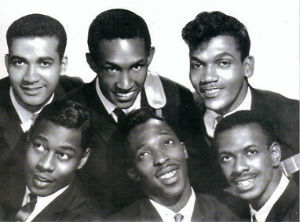 The Contours (Top L to R) Billy Hoggs, Hugh Davis, Hubert Johnson (Bottom L to R) Sylvester Potts, Billy Gordon, Joe Billingslea
The Contours (Top L to R) Billy Hoggs, Hugh Davis, Hubert Johnson (Bottom L to R) Sylvester Potts, Billy Gordon, Joe Billingslea
Potts went to Northeastern High, the same school that Mary Wilson, Bobby Rogers, and Martha Reeves attended. He told author Bill Dahl that “everybody at that time was singing in groups in school. You go into the bathroom, get that echo chamber.” The Contours were inspired by fellow Detroiter Hank Ballard’s dance-crazy Midnighters. Potts also told Dahl: “I knew the Midnighters when they used to rehearse in my basement. My father and Alonzo Tucker, the one who originated the Midnighters, used to play together.”
That same year, the group auditioned for Motown Records. Berry Gordy’s label had enjoyed success with hit songs by Marv Johnson and Barrett Strong, but had to lease their early hits to bigger labels for national distribution. By the time that The Contours auditioned for Gordy, Motown had started to distribute its own records and were enjoying their first # 1 R&B hit with “Shop Around” by The Miracles.
Although he liked their sound, Berry Gordy suggested that The Contours take a few more months to polish their act before auditioning again. The group was disappointed but had an ace in the hole in the person of Jackie Wilson, who was Hubert Johnson’s cousin. Wilson was one of the biggest national recording stars in 1960 with 10 Top Ten R&B hits to his credit (4 of which reached # 1) and 11 singles that had crossed over to chart on Billboard’s Hot 100.
Gordy had co-written Jackie Wilson’s first five hit singles and when Wilson called him on behalf of The Contours, Gordy gave the group a second audition and signed them to his label. The Contours practiced their harmonies on the main drag in Detroit. “We just hung around 12th Street. That was the place to be,” said Potts. “We wrote a song called ‘12th Street’. That was one of the songs we auditioned for Berry. That was our ‘hood. We sung in just about every club on 12th, and some on the North End.” 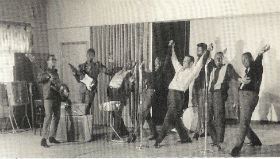 The Contours with Cholly Atkins
The Contours with Cholly Atkins
The Contours’ first single, “Whole Lotta Woman”, was produced by Berry Gordy and released on the Motown label in early 1961. The song was co-written by Hoggs and Gordon along with Smokey Robinson. Although it was very representative of the sound of their later hits, it failed to chart. Potts claimed that the song started out very differently. “Actually, it was a ballad called ‘Gloria With The Pretty Eyes’. We converted it and put a groove to it – for the better, I might add.”
Although their debut did not light any fires, the group’s stage gymnastics was quickly becoming the stuff of legend. The Contours did flips and splits during their performances. When guitarist Huey Davis came on board, the group expanded to a sextet, with Gordon and Hoggs handling most of the lead vocals.
The Contours tried to jump on the dance craze bandwagon with their second Motown single, “The Stretch”, but it was also a sales flop. The song was written by Mickey Stevenson along with Berry Gordy’s sister Loucye and her husband, sax player Ron Wakefield. The flipside was “Funny”, a doo-wop ballad also written by Stevenson along with group members Gordon and Potts. 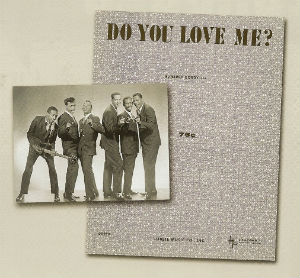 The Contours' biggest hit
The Contours' biggest hit
After two failures, the group really wanted a hit when they went into the studio to record their third single, “Do You Love Me” in 1962. The song was written by Berry Gordy, and there are two versions of how the song came to be recorded by The Contours.
The first is that Gordy had written the song for The Temptations who, like The Contours, had not yet had a hit single. Gordy felt that “Do You Love Me” was a potential hit and wanted to record and release it as soon as possible. When he couldn’t locate The Temptations, he ran into The Contours in the hallway at Motown and had them record the song. The Contours were reportedly so elated at Gordy’s offer to let them have “Do You Love Me” that they immediately began hugging and thanking him.
In a 2008 interview for Mojo magazine, however, Joe Billingslea gave a different version of the story. Billingslea stated to writer Phil Alexander that Gordy offered the song to The Contours first; and only intended to give it to The Temptations after The Contours had trouble while rehearsing it. After practicing the song a few more times, Gordy gave the nod to The Contours. 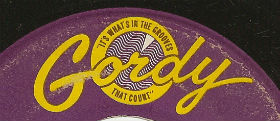
The single, featuring the sandpapery lead vocal of Billy Gordon, was the first hit on Motown’s new Gordy subsidiary label. The fake fade at the three-quarter mark of the song was the idea of the Satintones’ Sammy Mack. It was an interesting gimmick, but it became the bane of unsuspecting deejays nationwide. Nevertheless, “Do You Love Me” was one of the biggest 45s in the summer of 1962, reaching # 3 on the Hot 100 and # 1 on Billboard’s R&B chart. Typical of the hits of the early 60s, it mentioned popular dances of the day (the Twist and the Mashed Potatoes). It sold over I million copies and was one of Motown’s all-time fastest rising singles.
Their hit made stars of the Contours, and the group was billed high on the southern Motown Revue tour that fall, and where their offstage escapades rated a word of warning from Gordy for the female members on the bus to “stay away from the Contours. They are a bunch of hoodlums and they will ruin you!” Sylvester Potts laughed at the memory: “He was right! We were at that time a rowdy bunch. We were like the rebels of Motown”.
Taking advantage of their big hit, The Contours also released what would be their first and only album in the fall of 1962. Titled “Do You Love Me (Now That I Can Dance)”, it was the very first album issued on the Gordy label. Besides the group’s first three singles, the LP included “It Must Be Love”, a frantic tune composed by Billingslea, Potts, and guitarist Davis. Smokey Robinson contributed “The Old Miner”, and “Claudia” was penned by Clarence Paul, Andre Williams, and Joe Hunter. 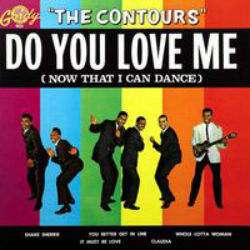 The Contours 1962 album
The Contours 1962 album
The album also contained both sides of the group’s new single, “Shake Sherry” and “You Better Get In Line”, both of which were composed for the Contours by Berry Gordy. Although “Shake Sherry” was a worthy follow-up to “Do You Love Me”, it failed to reach the Billboard Top 40, stalling at # 43 early in 1963. The song did better on the R&B chart, peaking at # 21, but its comparative failure meant that their run as a headlining act on the Motortown Revues was short-lived.
The Contours’ slide on the charts continued with the release of “Don’t Let Her Be You Baby” in March of 1963. Despite once again boasting Berry Gordy’s songwriting and production, the rousing number only reached # 64 on the Hot 100. To make matters worse, Gordy turned over the songwriting reins for the group from this point on. His wife Raynoma penned the Contours’ next single, “You Get Ugly”, along with her brother Mike Ossman. The novelty tune was matched with “Pa, I Need A Car”, written by Brian Holland, Lamont Dozier, and Freddie Gorman. The single failed to chart, however, guaranteeing that 1963 would end on a sour note for The Contours. 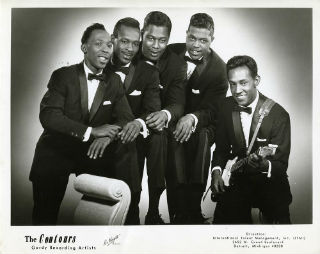
Gordy’s ex-wife, Thelma, got The Contours back on track with “Can You Do It”, a song she co-wrote with Richard Street of The Monitors. Street also produced the upbeat number which featured an intro similar to that on “Do You Love Me”. “Can You Do It” also had a rhythm that was perfect for doing the “Jerk”, a dance that had become all the rage in 1964. The song became the group’s biggest hit in almost two years when it reached # 41 on the Hot 100 and # 16 on the R&B chart.
Mickey Stevenson and Ivy Jo Hunter provided a great follow-up with “Can You Jerk Like Me” in the fall. It reached # 47 on the Hot 100 and # 15 on the R&B chart, but trouble was brewing.
Despite the comeback, The Contours’ original lineup was broken apart in late 1964 because of what were termed “irreconcilable creative differences” with Motown. “We had a dispute with Berry about a few things” said Sylvester Potts. “We were all supposed to leave. That was the original idea. We had a meeting. It was making a stand, really. And if we had all stuck together, we could have got what we wanted. But Billy Gordon double-crossed us, and because he did that, we just broke away.”
Motown reconstructed The Contours as a quartet, bringing in Council Gay, Jerry Green, and Alvin English to join Billy Gordon. This edition of the group’s first recording was the amusingly cynical “First I Look At The Purse”, written by Smokey Robinson and Bobby Rogers of The Miracles. Rogers told author Bill Dahl how he and Robinson came up with the song: “He and I were in a station wagon coming from Richmond, Virginia, and Smokey just looked at me and asked, ‘What does every man look at first?’” Rogers, who liked to tell jokes, replied: “Well man, first I look at the purse.” Rogers also provided the fey falsetto that opened the Contours’ 1965 recording and the gravelly lead vocal was performed by Billy Gordon. “First I Look At The Purse” reached # 57 on the Hot 100 and was a # 12 hit on the R&B chart, but it would prove to be Gordon’s swan song with the group.
Shortly after Sylvester Potts returned to replace Alvin English, Billy Gordon was dismissed from the group because of his drug problem and was replaced by Joe Stubbs, formerly of The Falcons and the younger brother of the Four Tops’ Levi Stubbs. This lineup had a minor hit with “Just A Little Misunderstanding” in 1966. The song was written by Stevie Wonder, Morris Broadnax, and Clarence Paul; and although it only peaked # 85 on the Hot 100, it was a much bigger R&B hit, reaching # 18. 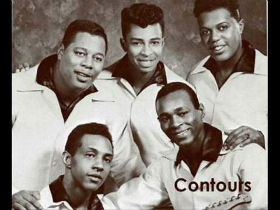 Dennis Edwards (center top row)
Dennis Edwards (center top row)
Joe Stubbs’ tenure as the group’s lead singer was a short one. After he left to join 100 Proof Aged in Soul, Dennis Edwards was recruited to replace him. Edwards, a Birmingham, Alabama, native who began singing in his father’s church at the age of two, had been gigging around his adopted city of Detroit with The Firebirds.
Edwards had played the keyboards in his first group and was a fine singer, but the Contours soon discovered that he couldn’t dance. According to Sylvester Potts “We worked with him. I often told the Temptations, ‘We broke Dennis in for you!’ We stayed up all night with him. There weren’t too many songs. He had to do some songs in the background, because Jerry Green was doing most of the leads that Billy did.”
Dennis Edwards did sing lead on what would prove to be the Contours’ final Gordy single in 1967. The a-side, “It’s So Hard Being A Loser”, was a minor hit, reaching # 79 on the Hot 100 and # 35 on the R&B chart. Edwards also did the lead on the b-side, “Your Love Grows More Precious Everyday”, which was written by Davis and Potts. The Contours disbanded after their recording contract expired later in the year.
In 1971, original member Joe Billingslea revived the group to play a few dates. By 1981, The Contours consisted of Billingslea, Council Gay, and three new members: Arthur Hinson, Martin “Beanie” Upshire, and Avory “Breeze” Hatcher. The Contours began playing more dates, but in 1984, Hinson left and was replaced by R. Charles Davis, followed by Council Gay a week later, who was replaced by Sylvester Potts. In 1987, Hatcher left the group and Arthur Hinson returned. 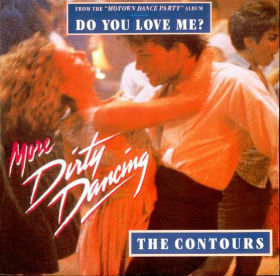
The Contours’ fortunes received a major shot in the arm when “Do You Love Me” was included in the movie Dirty Dancing, starring Patrick Swayze and Jennifer Grey. This revived the song, which was reissued on the Motown label, and it returned to the Hot 100 in July of 1988 for eight weeks, peaking at # 11 twenty-six years after it first became a smash hit for the group. The song was also included on the second multi-platinum soundtrack album from the film, 1988’s “More Dirty Dancing”.
The hit movie and its soundtrack spawned a ten-month Dirty Dancing Concert Tour, which featured The Contours along with other artists who had been on the films soundtrack, including Bill Medley, Eric Carmen, Ronnie Spector, Merry Clayton and a set of dancers from the movie. A week before the tour was to begin, “Beanie” Upshire was replaced by Darrel Nunlee. This version of The Contours played the entire tour and appeared in front of over 2 million fans in eight countries. The tour gave birth to a live album in 1989, “Dirty Dancing Live In Concert”, which included “Do You Love Me” and three other songs performed by The Contours. The group then signed a recording contract with Ian Levine’s Motorcity Records and released one album, titled “Flashback”, in 1990.
Arthur Hinson left the group that same year, and The Contours continued as a quartet until 1993 when Darrel Nunlee left and new members Gary Grier and Al Chisholm were added to bring it back to a five-man lineup. In 1998, this configuration released a CD called “Great Dirty Dancing Hits”. 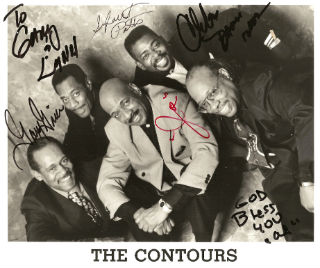 The Contours 1993
The Contours 1993
In 2004, Sylvester Potts left to form his own group of Contours and recruited the members of a local Detroit group called Upscale that included Leroy Seabrooks, Kim Green, Tony Womack, and former Contour Darrel Nunlee. Billingslea sued and Potts countersued, each claiming the rights to the name.
The suits were resolved in an out-of-court settlement which provided for the existence of both groups to be identified as ‘The Contours with Joe Billingslea’ and ‘The Contours featuring Sylvester Potts’, respectively. Within months of the founding of the Potts’ group, Seabrook left making it a quartet. In 2006, The Contours with Joe Billingslea added Odell Jones. In 2011, Nunlee left Potts’ group and was replaced by Tee Turner. Both of these Contours groups are still performing.
The Contours were inducted into the Doo-Wop Hall of Fame in 2010. The group was selected as a Historical Inductee to the Michigan Rock and Roll Legends online Hall of Fame in 2016.
Sources:
Motown: The Golden Years (The Contours) by Bill Dahl 2001. Krause Publications.
The Contours Official Site

